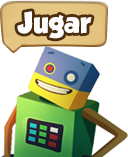The first mission in the Advanced set asks you to help Robo collect all the cupcakes for a birthday party using the fewest code blocks possible. Once you have a solution, you will be asked which Python or JavaScript lines can be used to replace a certain block. Finally, you will have to write out some of the lines of code to accomplish the same mission.
The second mission takes place in the moon world, where Robo is all set to go to the moon. We will use the same method of evaluation as in the previous mission, but this time you will be asked to check the color of the cell that contains the satellite. If it is green, you should get the second satellite, if not you should not go further.
The third mission takes place on a volcanic island, where Robo sets off on an adventure and tries to get out safely. Robo must read numbers from cells, add them together, and print the result on the screen.
The fourth mission will take you to the ice world, where Robo learns about the way of life embraced by the indigenous people tries his hand at several missions including fishing, saving food and water, and learn about local tools and equipment. In this mission, Robo will need to count the number of cracked ice cells without falling into the broken cells. He will continue until he reaches the igloo and collects it.
The fifth mission returns you to the moon world, where Robo is asked to read the text written on certain cells. He can use this information to tell which astronauts walked on the moon and the year they did so.
The final mission in the Hour of Code challenge takes place in the golden mountain world that is full of treasures and adventures. Robo is eager to find the treasure, but he had better not be greedy if he wants to leave the mountain safely. Robo must add letters to the beginnings of sentences to complete the quote that is written on the floor. When he’s done, he must print the result on the screen.
Throughout all six missions, the student learns about a variety of programming concepts, including variables, strings, mathematical operations, reading and writing from cells, and much more. They also learn corresponding Python or JavaScript code that matches the blocks they have used. This helps them to become familiar with the syntax of both languages. It only takes six missions to become familiar with key concepts, so imagine what level of understanding you will have as you complete all the RoboGarden journeys.
Try RoboGarden’s Hour of Code activities now and earn your completion certificate today.

